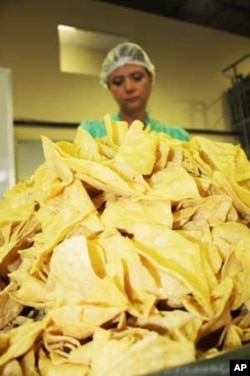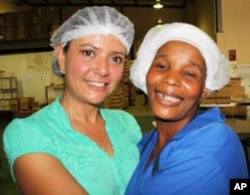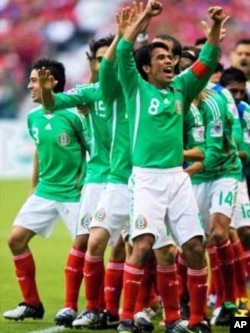A gleaming silver machine clicks and whirrs as it expels row upon row of hot Mexican tostados – or corn chips - at a factory in Midrand, between Johannesburg and Pretoria. The uncooked chips fall into a large bucket, and are hauled away to be deep fried in big vats of boiling oil.
Near sacks of flour piled high to the roof, Gaby Agraz points to another piece of equipment. “This one is specially imported from Mexico. It produces between 15,000 and 18,000 wheat tortillas every day,” she says proudly. “This has made a real difference to the Mexican community living in South Africa because the average Mexican eats three to four tortillas with every meal.”
Her business partner and husband, Hector, adds, “The tortilla is to Mexicans what bread is to the French, or biltong (dried meat) is to a South African. Wherever a Mexican is, he or she will try to find tortillas and if they find someone who’s making them, that person will be their star in the world!”
The Agraz’s also produce 500kg of nachos – triangular tortilla chips - every day, and 1, 500 corn tortillas every week. Their progress has been phenomenal.
“We came here almost 15 years ago with nothing! No factory, no employees, no machinery – nothing!” Hector exclaims.
In 1995, fresh from Mexico City, the Agraz couple found themselves in Johannesburg – a metropolis then, as now, labeled the most crime-ridden in the world. They were following a vision – to establish Africa’s first “homegrown” Mexican food manufacturing company.
“All our people back in Mexico thought we were insane, but we saw a gap in Africa and South Africa was the perfect place to allow us to fill that gap,” Gaby tells VOA.
The Agraz’s “insanity” has paid off, and they now operate the biggest Mexican food business in Africa, supplying restaurants and supermarkets throughout southern Africa with traditional Mexican fare.
‘Mexico is in our hearts’
In December last year, when the World Cup draw happened and Mexico was pulled from the pot to play South Africa in the World Cup’s opening game, Gaby says her family became very excited. “All of a sudden we started receiving phone calls and (sending SMS messages) to all our friends around South Africa (saying) ‘Can you believe it; out of all the countries in the world it’s Mexico!’”
The Agraz family has tickets for the tournament’s historic first match, on June 11th at Johannesburg’s Soccer City Stadium. “We are guarding them like gold,” says Gaby. “It’s going to be a great experience – being able to wear the green shirt (of the Mexican team) and supporting Mexico - because even though we’ve been in South Africa for 14 years, Mexico is in our hearts.”
As the months have become days until the big kick-off, Mexican news media have descended upon the Agraz factory, “because it’s a little piece of Mexico right in the middle of the host country!” Hector explains.
“Mexican journalists want to know about how life is in South Africa, and I have had no hesitation in telling them how beautiful it is here and how beautiful the people are,” says Gaby.
Friendly South Africa
The Mexican embassy in Pretoria expects about 25,000 Mexicans to travel to South Africa for the World Cup. “It’s going to be a tequila and tortilla tidal wave here soon,” Gaby jests.
The Agraz’s plan to give the visitors as much advice as possible to make sure they have a wonderful time in South Africa. Gaby says she’ll take “great pleasure” in describing the country as one of the friendliest places she’s ever been.
“People (here) are just so open and so happy and they just greet you so nicely,” she says. But the Agraz’s say some Mexican ticket holders they’ve spoken with are very concerned about South Africa’s high crime rate.
“As in any other part of the world I would tell them to be very careful (when they’re here),” Gaby states, and Hector interjects, “If you’re going to go out wearing a gold Rolex (in some parts of South Africa) – definitely, (criminals are) going to take it away from you.”
Gaby adds that she’s told Mexicans coming to South Africa for the World Cup that they shouldn’t be so afraid of crime as to “lock themselves in their hotel rooms” after matches. “They should travel in groups” to safely experience South Africa’s diverse attractions, she emphasizes.
Gaby maintains the World Cup is an opportunity for South Africans “to correct a lot of misperceptions” about their country. “It’s amazing that people out there, even in Mexico, think that South Africa is all bush with lions roaming around everywhere, and that there is a criminal on every street corner here,” she says. “It’s the same that happens to us when we tell a South African that we are from Mexico – they think that we are all little Indians with a big hat and pulling a donkey!”
So, she says, the World Cup opening game offers a chance for South Africans and Mexicans to learn more about one another and to “enjoy one another no matter who wins or loses.”
Shosholoza versus chickity boom
Hector’s “a bit worried” that the Mexican players and fans aren’t prepared for South Africa’s icy winter weather. “In the middle of June, it’s damn cold down here!” he says, shivering theatrically. But his wife’s more concerned about the “terrible” racket that tens of thousands of manic South African fans are going to make with their controversial vuvuzela plastic trumpets.
“I don’t like those! They’re just so annoying,” she exclaims. “I really hoped (the World Cup organizers) would ban them.” Her husband agrees, adding, “If South African fans leave those vuvuzelas at home and rather sing ‘Shosholoza’ then the Mexico team will be in serious trouble.”
‘Shosholoza’ – a Zulu expression meaning ‘push forward’ - is arguably South Africa’s most inspiring sports anthem. It has its roots in the struggle against apartheid, first being sung by black male work gangs engaged in poorly paid hard labor. The song encourages the stimela – a train, representing the people of South Africa - to overcome “high mountains,” to “fight” and to “triumph” over adversity.
“A few years ago I was at a game between South Africa and Congo and the whole stadium started singing Shosholoza,” Hector tells VOA. “It was one of the most moving experiences of my life. I was crying. It’s amazing how well South Africans sing.”
But, no matter what kind of noise the South African fans choose to make, Hector’s confident that their Mexican counterparts will have the “firepower” to overcome their hosts. “We (Mexicans) have a war cry – (it’s called) ‘chickity boom!’ You South Africans will be hearing it soon enough!” he warns.
Tequila!
Gaby declares confidently that Mexico will beat South Africa 2 – 0. Hector says, “My prediction is Mexico will top the group. (It’ll be) 3 - 1 (against South Africa); the second match is France - we’re going to beat (them) 1 – 0 and we’re going to go 1 – 1 with Uruguay.”
He jokes that when South Africa loses to Mexico, the Mexican supporters will be “more than happy” to supply their hosts with tequila - the most Mexican of alcoholic beverages – to allow them to “drown their sorrows.”
But he’s aware that South Africans will be hoping the reverse comes true, and that it’s the locals who’ll be providing traditional drinks from their homeland to ease the pain of Mexico’s defeat.









